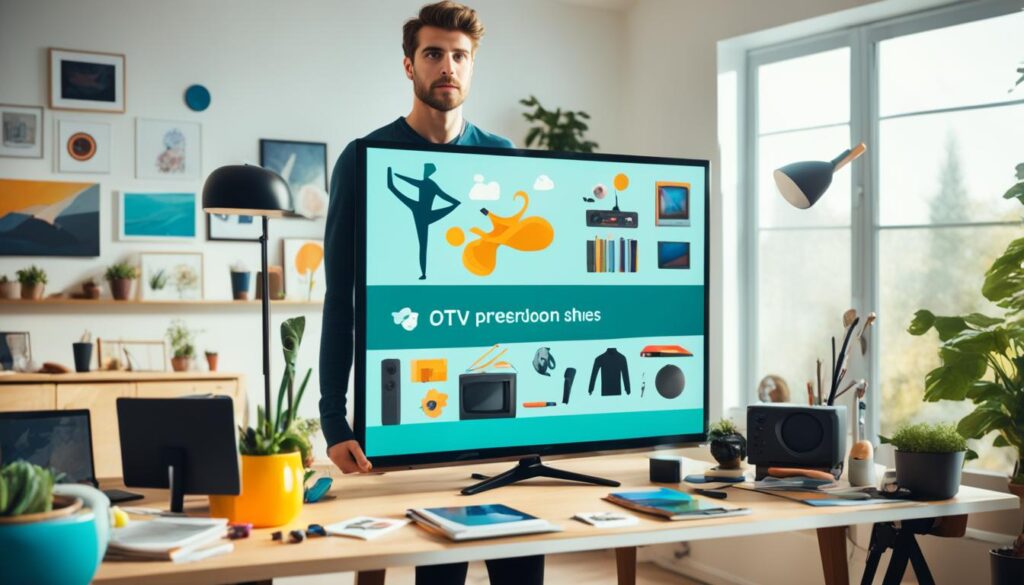“Thousands of candles can be lighted from a single candle, and the life of the candle will not be shortened. Happiness never decreases by being shared.” – Buddha
Are you tired of spending endless hours glued to the TV screen, feeling like your life is passing you by? It’s time to break free from the shackles of excessive TV watching and embrace a more fulfilling existence. In today’s fast-paced world, where screens dominate our lives, it’s crucial to find a balance and reclaim your time and energy for activities that truly nourish your soul.
In this article, we will guide you on how to stop watching TV and embark on a journey towards a more intentional and enriching life. We’ll explore practical tips, strategies, and healthy alternatives that will help you reduce your TV time and create new habits that prioritize personal growth and wellbeing. Let’s step out of the virtual reality and experience the joy of living in the present moment.
Key Takeaways:
- Discover healthy alternatives to fill your time instead of watching TV.
- Be aware of the negative impact excessive TV watching can have on your productivity and personal relationships.
- Overcome obstacles and create new habits to break free from the TV addiction.
- Set goals and create a schedule that allows for more fulfilling activities.
- Find support from friends and family to stay committed to your journey of reducing TV time.
The Impact of TV Addiction
Watching TV can become addictive and have detrimental effects on various aspects of your life. Breaking the TV addiction is essential to regain control over your time and refocus your energy on more fulfilling activities. Let’s explore the strategies for cutting back on television and reducing screen time habits.
Excessive TV watching can lead to decreased productivity as it consumes a significant amount of your time that could be utilized in more productive ways. By breaking the TV addiction, you can free up valuable hours to pursue personal and professional goals, engage in meaningful activities, and enhance your overall productivity.
Avoiding social interaction is another consequence of excessive TV watching. Spending hours in isolation, engrossed in fictional characters and stories can take a toll on your relationships with family, friends, and even colleagues. Limiting screen time enables you to prioritize connecting with loved ones, strengthening bonds, and nurturing meaningful relationships.
Furthermore, excessive TV viewing often translates into a sedentary lifestyle, resulting in reduced physical activity. This can lead to various health problems, such as weight gain, cardiovascular issues, and decreased mobility. By breaking the TV addiction, you can embrace an active lifestyle, incorporating exercise, outdoor activities, and hobbies that promote physical well-being.
Strategies for Cutting Back on Television
Now that the negative impact of TV addiction is clear, it’s time to learn effective strategies to cut back on television and reduce screen time habits. Here are a few strategies to get you started:
- Set specific limits: Determine the maximum amount of time you will allocate to TV viewing each day or week. Use a timer or alarm to remind yourself when it’s time to turn off the TV and engage in other activities.
- Find alternative hobbies: Discover new hobbies or rediscover old ones that keep you engaged and entertained. Whether it’s painting, gardening, writing, or playing a musical instrument, immersing yourself in meaningful activities can help fill the void left by cutting back on TV.
- Create a schedule: Plan your day or week in advance, allocating specific time slots for various activities. This will help you stay organized, ensure you have time for important tasks, and prevent mindless TV watching.
- Establish a TV-free zone: Designate a specific area in your home where TV is off-limits. This could be your bedroom, dining area, or any space that you want to keep solely for relaxation, conversation, or other meaningful activities.
By implementing these strategies and taking control of your TV consumption, you can break the addiction and pave the way for a more fulfilling and balanced lifestyle.

| Consequences of TV Addiction | Effects |
|---|---|
| Decreased productivity | Time spent watching TV could be used for more productive activities such as work, personal development, or pursuing hobbies. |
| Lack of social interaction | Excessive TV watching can lead to isolation and hinder opportunities for socializing, building relationships, and engaging with others. |
| Reduced physical activity | TV addiction often results in a sedentary lifestyle, contributing to health issues and a decline in physical well-being. |
Discovering Healthy Alternatives
Instead of watching TV, you can explore a wide range of healthy alternatives that will not only entertain you but also enrich your life. By engaging in these activities, you can break free from the TV screen and embrace a more fulfilling lifestyle.
1. Explore New Hobbies
Discovering new hobbies is a great way to stimulate your mind and engage in activities that bring you joy. Whether it’s painting, cooking, gardening, or learning a musical instrument, there are endless possibilities to explore. Use your free time to pursue these hobbies and unlock your creative potential.
2. Read Books
Reading is an excellent alternative to watching TV as it allows you to immerse yourself in different worlds, gain knowledge, and expand your imagination. Choose a genre that interests you, whether it’s fiction, non-fiction, self-help, or biographies, and let the power of words transport you to new realms of discovery.
3. Go for Walks
Getting outdoors and going for walks is a healthy and revitalizing alternative to sedentary TV watching. Take the opportunity to explore your neighborhood, visit local parks or nature trails, and enjoy the benefits of fresh air and exercise. Walking not only boosts your physical well-being but also provides a chance to clear your mind and appreciate the beauty of the world around you.
4. Attend Events or Classes
Expand your horizons by attending events or enrolling in classes that align with your interests. Whether it’s art exhibitions, cooking workshops, dance lessons, or photography seminars, these experiences offer stimulating opportunities for personal growth, socializing, and learning new skills.
5. Spend Quality Time with Friends and Family
Instead of being glued to the TV, prioritize spending quality time with your loved ones. Plan game nights, organize outings, or simply have heart-to-heart conversations. Building and nurturing relationships creates meaningful connections and strengthens the bonds that are fundamental to a fulfilling life.
Remember, the key to breaking the TV habit is to replace it with activities that bring you true fulfillment. Embracing these healthy alternatives will not only reduce your screen time but also open up a world of possibilities for personal growth, creativity, and connection. So, step away from the TV and embark on an enriching journey filled with new experiences and meaningful interactions.
Overcoming Obstacles and Creating New Habits
Breaking the habit of excessive TV watching can be challenging, but with persistence and determination, you can create new habits that prioritize other activities over TV. By implementing effective strategies, you can break the TV habit and embrace a more balanced lifestyle.
Here are some ways to break the TV habit and limit screen time:
- Set realistic goals: Start by setting achievable goals for reducing your TV time. For example, aim to watch one hour less of TV each day and gradually decrease it over time. Reward yourself for reaching milestones, such as a week without excessive TV watching.
- Create a schedule: Plan your day and allocate specific time slots for activities other than watching TV. Use a planner or digital calendar to organize your time effectively. Fill these slots with hobbies, exercise, socializing, or pursuing personal growth.
- Find support: Reach out to friends and family members who can support you in breaking the TV habit. Surround yourself with like-minded individuals who encourage healthier habits and motivate you to engage in other activities.
- Limit access: Remove temptations by limiting your access to TV. Consider unsubscribing from streaming services, removing TV sets from your bedroom, or using parental controls to restrict TV usage.
- Try new hobbies: Explore new hobbies that captivate your interest and keep you engaged. Whether it’s painting, cooking, playing an instrument, or learning a new language, discover activities that spark joy and fulfill your time in a meaningful way.
Stay Committed and Celebrate Progress
Changing habits takes time, so be patient with yourself. Celebrate small victories along the way to stay motivated and reinforce positive behavior. Remember, by breaking the TV habit, you open doors to new experiences, personal growth, and a more fulfilling life.

| Benefits of Breaking the TV Habit | Strategies for Limiting Screen Time |
|---|---|
| 1. Increased productivity | 1. Set goals and create a schedule |
| 2. Improved physical health | 2. Find support from friends and family |
| 3. Enhanced mental well-being | 3. Limit access to TV |
| 4. More quality time with loved ones | 4. Try new hobbies and activities |
| 5. Increased opportunity for personal growth | 5. Celebrate progress and stay committed |
Conclusion
Breaking the habit of excessive TV watching is within your reach. By implementing effective strategies, you can reclaim your time and live a more fulfilling and productive life.
To reduce your TV time, start by finding healthy alternatives that align with your interests and passions. Engage in activities such as pursuing hobbies, reading books, or spending quality time with loved ones. These alternatives will not only fill the void left by TV but also provide you with opportunities for growth and personal development.
Overcoming the obstacles that come with cutting back on television requires determination and perseverance. Set goals for yourself and create a schedule that allows for intentional time away from the screen. Seek support from friends and family who can hold you accountable and provide encouragement along the way.
By gradually replacing TV with activities that bring joy and fulfillment, you can create new habits that prioritize a well-rounded lifestyle. Remember, it is through these small steps that lasting change occurs. Embrace the journey of reducing TV time and discover the richness that comes with living a life focused on meaningful connections and personal growth.

